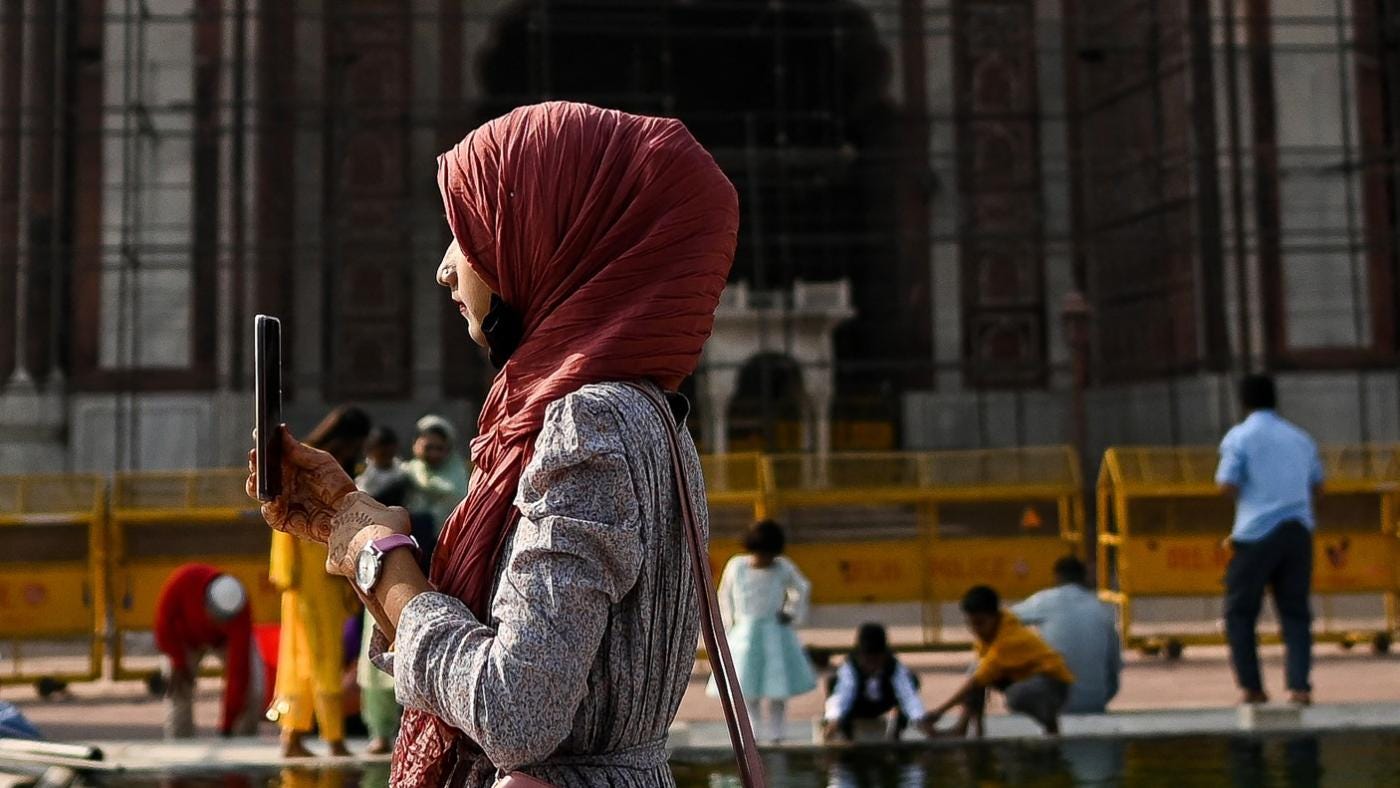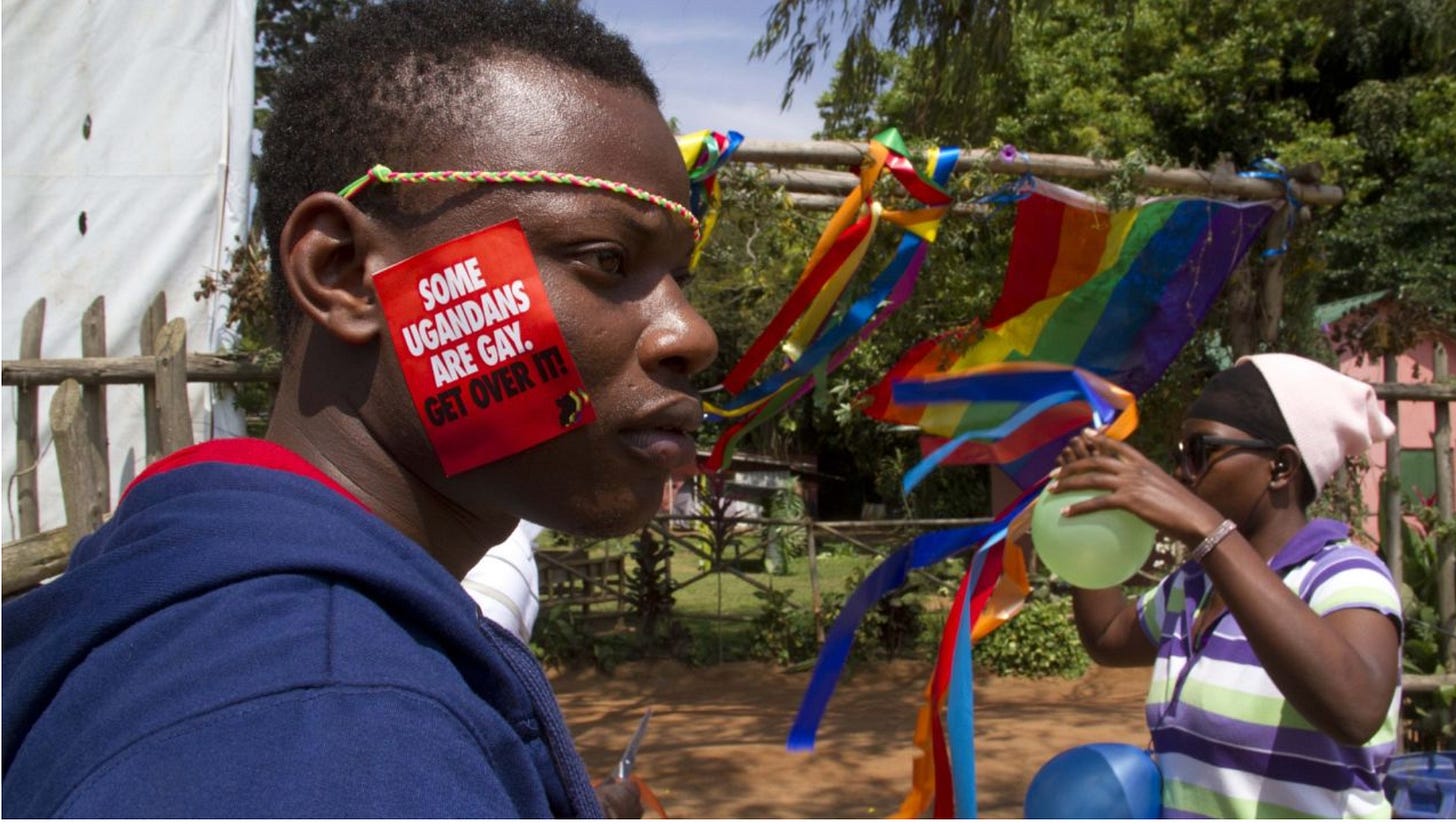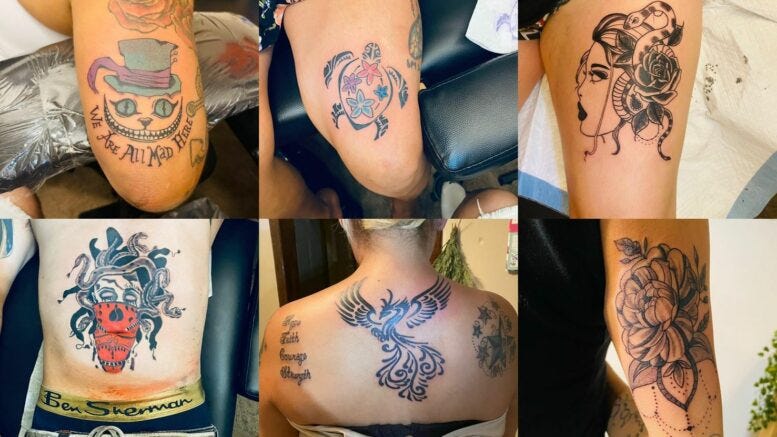Global Roundup: Kenya Self Defence for Older Women, Turkmenistan Women’s Health, India Hijabi Women, Uganda LGBTQ Rights, LGBT Indigenous Tattoo Artist
Curated by FG Contributor Samiha Hossain
Group leader Beatrice Nyariara, in the blue dress, demonstrates a punching technique. Photographs by Brian Otieno via The Guardian
Shosho Jikinge, Swahili for “Grandmother protect yourself,” is a group of 20 women aged between 55 and 90 who all live in Korogocho, Kenya and are learning how to defend themselves from sexual assault and other crimes. Beatrice Nyariara, 81, is the founder of the group and the one who leads the self defence classes.
About 10 km north-east of the city centre, Korogocho is one of the capital city Nairobi’s largest and most densely populated informal settlements. It is also one of the most dangerous, enduring high unemployment rates, poverty, drug and alcohol abuse, domestic violence and crime.
We started this group in 2007 when we realised that elderly women had become easy targets of rape and abuse. -Beatrice Nyariara
Gladys Wanjiku, 80, another Korogocho resident and member of the class, says criminals take advantage of the fact that most elderly women are widows who live by themselves. Screaming for help does not help, as gender-based violence is so prevalent in the area that neighbours assume any shouts are from a fight between a couple. The group decided they needed to raise the alarm in a manner that would ensure people would respond. Today, when the community hears ‘No! No! No! I don’t want anything to do with you,’ they know it is an elderly woman being attacked and they come to help, says Wanjiku. The classes also help the women stay fit.
Most of us have health issues, such as arthritis and blood pressure, so when we meet, we do some exercises, which is good for the body. -Rosemary Ouma, 55
The training teaches the women how to hit assailants hard on the parts that hurt the most. Nyariara’s face shines with pride as she tells of her encounter with an attacker who tried to force himself into her home.
I warned him that if I opened the door, one of us would wind up in a police cell and the other in the mortuary. He assumed I would open the door and wait for him to get in, but I opened it and walked out, poking his eyes with my fingers. He was startled and retreated. I followed him and punched him on his ‘potatoes.’ -Beatrice Nyariara
Older women are rarely thought of when it comes to gender-based violence, yet they are particularly vulnerable. Shosho Jikinge is an inspiring initiative where older women are asserting their agency and making it known they are not to be messed with.
Women watch dancers performing for delegates at an international conference in the Turkmenistan capital, Ashgabat. Photograph: B O’Kane/Alamy via The Guardian
Aynabat Yaylymova is the founder and editor of Saglyk.org, the only website with credible public health information on abortion, contraception and domestic violence in the Turkmen language. Yaylymova and her colleagues have been calling for nuanced and informed conversations by educating the public and advocating for science-based best practices in public health in Turkmenistan.
Saglyk’s comprehensive content on sexual and reproductive health is our most read. There is a great demand for this information, especially among women and girls. Turkmen schools don’t teach it. Families don’t discuss it. The media does not publish stories about it. The public space to discuss this basic aspect of being human is nonexistent. -Aynabat Yaylymova
Yaylymova discusses how access to information is severely curtailed, as the state owns or controls all media and the internet is aggressively censored and restricted. The government does not provide science-based information or public health data, leading women and girls to have poor health outcomes and little agency.
According to the latest UN population fund figures, only 50% of Turkmen women who are married or in a relationship are using a modern form of contraception. And across all women aged 15-49, 8% have an unmet need for contraception. The first national report on domestic violence against women, published by UNFPA in August 2022, found that 58% of women aged 15-49 believe that violating the restrictions and obligations imposed by a spouse is sufficient reason for a husband to beat his wife.
Patriarchal culture, harmful traditions, government inaction and absence of public education and communication drive awareness of reproductive and sexual health underground. -Aynabat Yaylymova
Yaylymova says that intimate partner violence and abortions are thought to be a private matter and thus endured in silence. In 2015, the government passed a law restricting abortion to only up to five weeks. Before 2015, women in Turkmenistan were allowed to access abortion care up to 12 weeks.
Saglyk has created a safe space to anonymously share stories of domestic violence, abuse and harassment. Its Bilim app helps women and girls track their periods and learn about their health and rights (Bilim means both period and knowledge). However, Yaylymova acknowledges that it is not enough to bring structural changes to society, so they have been increasingly engaging with international organisations and asking organisations that grant or lend money to the country to hold the government accountable on its international commitments to gender equality.
A woman uses her mobile phone to take a picture as she visits the Jama Masjid mosque in the walled city area of New Delhi on 26 November 2022 (AFP) via Middle East Eye
Nabiya Khan is an educator, a social rights activist, community organiser, and a protest poet based in New Delhi, India – she writes about being a hijabi in Prime Minister Narendra Modi’s India. Khan says that being harassed for wearing the hijab has become a daily reality for many Muslim women in the country.
According to a recent report from the People’s Union for Civil Liberties, more than 1,000 Muslim girls in the Karnataka state have left college amid a systematic campaign to isolate hijabi women from educational institutions. Hindutva organisations have carried out a vicious campaign against students wearing hijabs, fuelled by government and police inaction. Karnataka’s ban on hijabs in educational institutions was upheld last year by the state’s high court, thus denying these women the right to an education.
Hijabi women, including myself, must negotiate a culture that frequently views us as second-class citizens, less deserving of respect and dignity, amid the growth of Hindu nationalism and the current political atmosphere. -Nabiya Khan
Many hijabi women are denied employment opportunities or subjected to unequal treatment in the workplace because of their hijab, according to Khan. She cites a recent example of Ghazala Ahmad, a young hijabi journalist who was denied a job at a media channel. Despite her qualifications and experience, the recruiters reportedly told her that she would not get the job if she did not remove her headscarf.
Despite India being a secular country, the government has failed to take a strong stance against the discrimination faced by hijabi women. In some cases, police have been complicit in the abuse and discrimination, either turning a blind eye or actively participating in it. This has left many hijabi women feeling vulnerable and afraid to speak out. -Nabiya Khan
Khan calls being a hijabi in Modi’s India “difficult and alienating.” She calls out Modi for using the guise of protecting women to justify oppressive actions and for not being a champion of religious freedom and diversity. Ultimately, Khan wants Muslim women to be able to exist without all these preconceptions and fear of violence.
The hijab has emerged as a flashpoint in this cultural moment - a visible symbol of Otherness in a country that is growing more hostile to people who don’t fit the values of the Hindu majority. The reality of being a hijabi woman in Modi’s India is one of constant scrutiny and fear, but also one of resilience, determination and unwavering faith. -Nabiya Khan
A Ugandan man with a sticker on his face takes part in the annual gay pride in Entebbe, Uganda, on August 9, 2014. Photo by Isaac Kasamani/AFP/Getty Images via CNN
Anna (not her real name), a trans woman, has not let traumatic experiences stop her from speaking out, and calling for the protection of LGBTQ rights in her country. Now, according to recent media reports, a teacher has been transferred from his school to another location for engaging in homosexual activities, sparking further public outcry. But Anna said she is not surprised, and insisted that people must be allowed to express their sexuality no matter where they find themselves. Of course, Anna does not believe teachers should be involved with students, regardless of their sexuality. However, that does not mean students should not express their sexuality.
Teachers and students have been cited as superspreaders of what some Ugandan lawmakers have called character-killing morals. Debates have already taken place on the floor of Uganda's parliament amid reports about sexual minorities gaining ground in schools. Anita Among, the speaker of parliament, has now directed the Education Committee to investigate schools suspected of encouraging LGBTQ rights.
Homosexuality remains illegal in Uganda, despite a 2016 court ruling that found the 2014 Uganda Anti-Homosexuality Act invalid on procedural grounds. The Penal Code Act still categorizes homosexuality as a crime against morality.
These kinds of tactics to incite fear and fuel existing homophobic sentiments are unfortunately common among proponents of anti-LGBTQ ideology. LGBTQ activists continue to advocate that the protection of minors should not be conflated with suppressing LGBTQ expression – and in fact, we see the best outcomes when youth feel they will be accepted for their sexuality and gender expression.
Tattoo art by Phoebe Bull. (Facebook photo). via Alberta Native News
Phoebe Bull is an Indigenous tattoo artist in Canada who identifies as LGBT, Two-Spirit, and Lesbian. She shares challenges in her life, her journey through the Correctional Service of Canada and becoming a tattoo artist.
Bull says by the age of 30, she finally accepted herself as a lesbian in an institution. According to Statistics Canada, Indigenous people make up about 32 percent of the federal prison population, despite accounting for less than five percent of the total population. Bull believes the number to be higher from her personal experience and she says many of the women are part of the LGBT community.
Now, Bull is a tattoo artist which she calls her passion and something she hopes to do full-time one day.
I never knew I loved to do it. I enjoy creating art for people and being creative in general. I’ve had people come to me in tears. But I’ve also had people angry or even lost in life. One small tattoo helps them and puts a smile on their face. -Phoebe Bull
Bull shares how she was emotionally and physically abused by her mother’s husband as a child. By the time she was six years old, all four walls of her bedroom were covered in drawings and colours. She enjoyed intricate colouring drawings in prison as well. Bull believes this is where her creativity and the love of tattooing come from, and she connects with many people on this level. She specializes in Memorial or sentimental Tattoos.
Samiha Hossain (she/her) is a student at the University of Ottawa. She has experience working with survivors of sexual violence in her community, as well as conducting research on gender-based violence. A lot of her time is spent learning about and critically engaging with intersectional feminism, transformative justice and disability justice.
Samiha firmly believes in the power of connecting with people and listening to their stories to create solidarity and heal as a community. She refuses to let anyone thwart her imagination when it comes to envisioning a radically different future full of care webs, nurturance and collective liberation.






